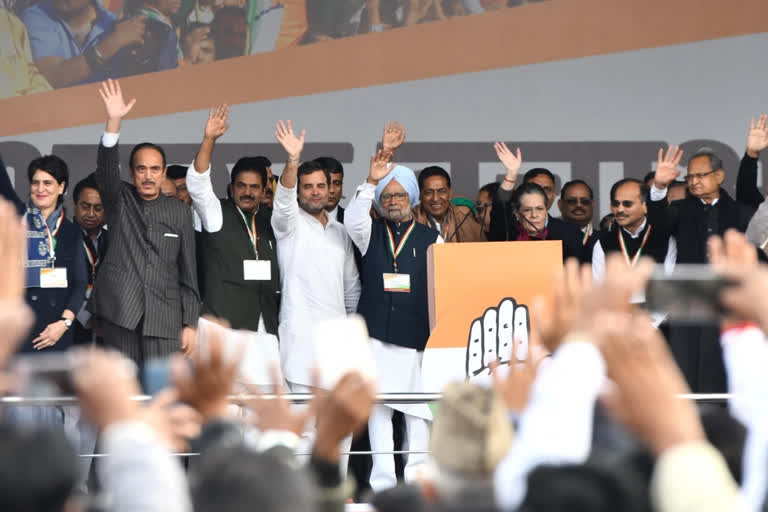New Delhi: Though names of several Congress veterans like Ashok Gehlot, Mallikarjun Kharge, Ghulam Nabi Azad, Mukul Wasnik and even Sushil Kumar Shinde have been doing the rounds of late as non-Gandhi party president probables, the chances of their success appear to be remote.
There are good reasons why this experiment is difficult to carry out in the first place and if by chance it does happen, how effective it would be.
The idea of a non-Gandhi Congress chief is not new. Former prime minister PV Narasimha Rao and his successor Sitaram Kesri occupied the position before Sonia Gandhi became party chief in 1998.
Last year, the names of veterans like Gehlot, Shinde, Wasnik and Kharge had again surfaced in the weeks after Rahul Gandhi resigned as Congress chief taking responsibility for the poor 2019 Lok Sabha poll results. Party insiders clarified the names of these veterans were discussed as an interim arrangement till Rahul was persuaded to take back his resignation.
Though each one of these veterans had an important place in the party system and were regarded by the leaders and workers alike, there was no pan-India consensus on their names when party managers tried to obtain feedback from various state units if having anyone of the above mentioned senior leaders as full-time or part-time party chief would be a sensible idea. The results were mixed and did not help the party managers arrive at a conclusion as Rahul continued to insist on having a non-Gandhi party chief.
Read: INTERVIEW: 'Cong needs new chief to give vision, inspire voters, take on BJP'
The choice, by chance or by design, then fell on Sonia Gandhi, who agreed to be back as party interim chief after running the Congress for 19 years but with a condition that a full time party chief would be finalized within a year.
Over the next 12 months, there was no clarity if the party was prepared to take a call on having a full time president though a buzz around Rahul’s comeback started building up in the Congress circles.
As Rahul remained reluctant to take over the reins from his mother, there were also some pro-Sonia voices emanating from the party saying the situation demanded she continue to be interim chief in the near future.
During the past one year, party leaders helplessly watched how little or no effort was made to checkmate the BJP's game to first win over young leader Jyotiradtya Scindia, poach on Congress legislators and then topple the Kamal Nath government in Madhya Pradesh in March 2020.
Despite several warnings that a repeat of MP-type operation was possible in Rajasthan, the party managers waited till the plan to topple the Ashok Gehlot unfolded and hit the Congress in July.
Read: It is status quo after Congress debates leadership issue for 7 hours
The two incidents showed the Congress had become a lazy opposition party and suffered from indecisiveness. The realization that things were perhaps going downhill triggered panic among the 23 veterans who wrote to Sonia demanding a full time party president and organization overhaul to arrest the drift.
The Congress Working Committee meet on August 24 in a way sealed the hopes of the dissenters and reiterated the Gandhis were in full control. In that backdrop, any discussions around a non-Gandhi party chief would be meaningless till the rebels muster enough courage to administer a split. But that again is unlikely.
The arguments behind having a non-Gandhi as party chief and letting the person prove his or her capability appear to be logically sound but are difficult to implement.
The key point is that the same set of seniors failed to agree upon a single name to lead the grand old party when they had an opportunity in the past. Given that fact, it may not be easy for an Azad, Kharge, Shinde or Sibal or Wasnik to keep the flock together.
In contrast, the Gandhis, despite their shortcomings, at least help the Congress keep a semblance of cohesiveness faced with an aggressive Bharatiya Janata Party led by PM Modi.
Read: Dilemma of being Congress party
Another important factor is that over the decades the Congress organization has been structured in such a manner that a non-Gandhi party chief, if not backed by the Gandhis, may not be able to work effectively. This would happen as the Gandhis would continue to exert their influence on workers and leaders resulting in two power centres.
It is also important to point out in this context that usually the first target of a political attack from PM Modi or any senior BJP functionary are the Gandhis and not the senior Congress leaders.
This, however, does not give the Gandhis a lifetime endorsement to rule the party but brings upon them a huge responsibility to administer radical changes in the way the party functions and be a catalyst for any painful surgeries that may be required to make the grand old party fighting fit.
The earlier damage control is done the better. A delay will only add to the tribe of dissenters who may be dormant now but can regroup in the future to spell out another leadership crisis.
The first sign of the Gandhis reaching out to Azad (one of the 23 signatories to the dissent letter) and assuring him of appropriate follow up action is fine but much more is expected of them.
Read: Cong 'dissenters' miffed content of as letter not discussed



